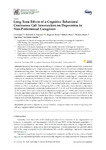Long-Term Effects of a Cognitive Behavioral Conference Call Intervention on Depression in Non-Professional Caregivers

Use this link to cite
http://hdl.handle.net/2183/27048Collections
- Investigación (FEDU) [938]
Metadata
Show full item recordTitle
Long-Term Effects of a Cognitive Behavioral Conference Call Intervention on Depression in Non-Professional CaregiversAuthor(s)
Date
2020Citation
Lopez, L.; Vázquez, F.L.; Torres, Á.J.; Otero, P.; Blanco, V.; Díaz, O.; Páramo, M. Long-Term Effects of a Cognitive Behavioral Conference Call Intervention on Depression in Non-Professional Caregivers. Int. J. Environ. Res. Public Health 2020, 17, 8329. https://doi.org/10.3390/ijerph17228329
Abstract
[Abstract] Recent evidence supports the efficacy of conference call cognitive–behavioral interventions in preventing depression in caregivers at post-intervention, but we do not know whether the results are sustained long term. The main objective of this study was to evaluate the long-term efficacy of a cognitive–behavioral intervention administered by telephone conference call in preventing depression in caregivers with elevated depressive symptoms, comparing all components of the intervention versus only the behavioral ones. A randomized controlled trial was conducted using a dismantling strategy. At total of 219 caregivers were randomly assigned to a cognitive–behavioral conference call intervention (CBCC; n = 69), a behavioral-activation conference call intervention (BACC; n = 70), or a usual care control group (CG, n = 80). Information was collected on depressive symptoms and depression at pre-intervention and at 1, 3, 6, 12, and 36 months post-intervention. At 36 months, there was a reduction in depressive symptoms (p < 0.001) and a lower incidence of major depressive episodes in both the CBCC and BACC groups compared to CG (8.7%, 8.6%, and 33.7%, respectively). The results show that a conference call intervention was effective in the long term to prevent depression in caregivers and that the behavioral-activation component was comparable to the complete cognitive–behavioral protocol.
Keywords
Prevention
Depression
Non-professional caregiver
Telephone
Dismantling
Long-term efficacy
Cognitive–behavioral intervention
Depression
Non-professional caregiver
Telephone
Dismantling
Long-term efficacy
Cognitive–behavioral intervention
Editor version
Rights
Atribución 4.0 Internacional






